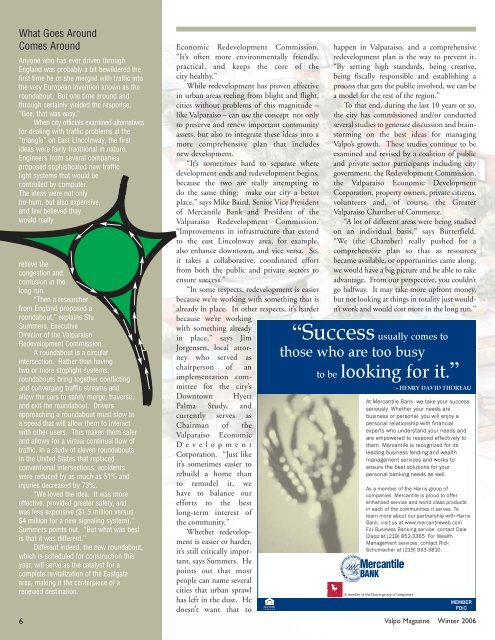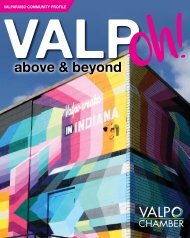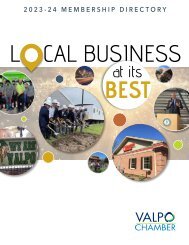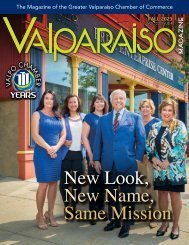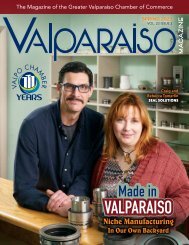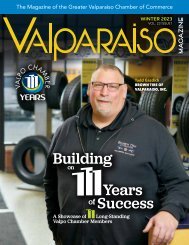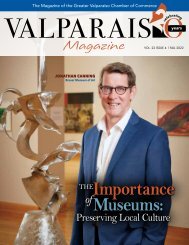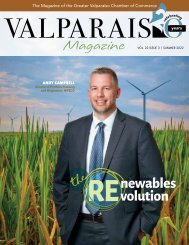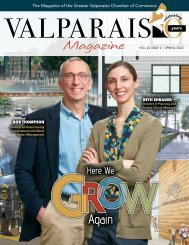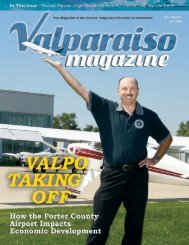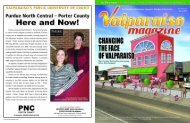Winter-2006
You also want an ePaper? Increase the reach of your titles
YUMPU automatically turns print PDFs into web optimized ePapers that Google loves.
85001_GVCC_Mag.qxd 1/13/06 9:10 AM Page 6<br />
What Goes Around<br />
Comes Around<br />
Anyone who has ever driven through<br />
England was probably a bit bewildered the<br />
first time he or she merged with traffic into<br />
the very European invention known as the<br />
roundabout. But one time around and<br />
through certainly yielded the response,<br />
“Gee, that was easy.”<br />
When city officials examined alternatives<br />
for dealing with traffic problems at the<br />
“triangle” on East Lincolnway, the first<br />
ideas were fairly traditional in nature.<br />
Engineers from several companies<br />
proposed sophisticated new traffic<br />
light systems that would be<br />
controlled by computer.<br />
The ideas were not only<br />
ho-hum, but also expensive,<br />
and few believed they<br />
would really<br />
relieve the<br />
congestion and<br />
confusion in the<br />
long run.<br />
“Then a researcher<br />
from England proposed a<br />
roundabout,” explains Stu<br />
Summers, Executive<br />
Director of the Valparaiso<br />
Redevelopment Commission.<br />
A roundabout is a circular<br />
intersection. Rather than having<br />
two or more stoplight systems,<br />
roundabouts bring together conflicting<br />
and converging traffic streams and<br />
allow the cars to safely merge, traverse,<br />
and exit the roundabout. Drivers<br />
approaching a roundabout must slow to<br />
a speed that will allow them to interact<br />
with other users. This makes them safer<br />
and allows for a virtual continual flow of<br />
traffic. In a study of eleven roundabouts<br />
in the United States that replaced<br />
conventional intersections, accidents<br />
were reduced by as much as 51% and<br />
injuries decreased by 73%.<br />
“We loved the idea. It was more<br />
effective, provided greater safety, and<br />
was less expensive ($1.5 million versus<br />
$4 million for a new signaling system),”<br />
Summers points out. “But what was best<br />
is that it was different.”<br />
Different indeed, the new roundabout,<br />
which is scheduled for construction this<br />
year, will serve as the catalyst for a<br />
complete revitalization of the Eastgate<br />
area, making it the centerpiece of a<br />
renewed destination.<br />
6<br />
Economic Redevelopment Commission.<br />
“It’s often more environmentally friendly,<br />
practical, and keeps the core of the<br />
city healthy.”<br />
While redevelopment has proven effective<br />
in urban areas reeling from blight and flight,<br />
cities without problems of this magnitude –<br />
like Valparaiso – can use the concept not only<br />
to preserve and renew important community<br />
assets, but also to integrate these ideas into a<br />
more comprehensive plan that includes<br />
new development.<br />
“It’s sometimes hard to separate where<br />
development ends and redevelopment begins,<br />
because the two are really attempting to<br />
do the same thing: make our city a better<br />
place,” says Mike Baird, Senior Vice President<br />
of Mercantile Bank and President of the<br />
Valparaiso Redevelopment Commission.<br />
“Improvements in infrastructure that extend<br />
to the east Lincolnway area, for example,<br />
also enhance downtown, and vice versa. So,<br />
it takes a collaborative, coordinated effort<br />
from both the public and private sectors to<br />
ensure success.”<br />
“In some respects, redevelopment is easier<br />
because we’re working with something that is<br />
already in place. In other respects, it’s harder<br />
because we’re working<br />
with something already<br />
in place,” says Jim<br />
Jorgensen, local attorney<br />
who served as<br />
chairperson of an<br />
implementation committee<br />
for the city’s<br />
Downtown Hyett<br />
Palma Study, and<br />
currently serves as<br />
Chairman of the<br />
Valparaiso Economic<br />
Development<br />
Corporation. “Just like<br />
it’s sometimes easier to<br />
rebuild a home than<br />
to remodel it, we<br />
have to balance our<br />
efforts to the best<br />
long-term interest of<br />
the community.”<br />
Whether redevelopment<br />
is easier or harder,<br />
it’s still critically important,<br />
says Summers. He<br />
points out that most<br />
people can name several<br />
cities that urban sprawl<br />
has left in the dust. He<br />
doesn’t want that to<br />
EQUAL HOUSING<br />
L E N D E R<br />
happen in Valparaiso, and a comprehensive<br />
redevelopment plan is the way to prevent it.<br />
“By setting high standards, being creative,<br />
being fiscally responsible and establishing a<br />
process that gets the public involved, we can be<br />
a model for the rest of the region.”<br />
To that end, during the last 10 years or so,<br />
the city has commissioned and/or conducted<br />
several studies to generate discussion and brainstorming<br />
on the best ideas for managing<br />
Valpo’s growth. These studies continue to be<br />
examined and revised by a coalition of public<br />
and private sector participants including city<br />
government, the Redevelopment Commission,<br />
the Valparaiso Economic Development<br />
Corporation, property owners, private citizens,<br />
volunteers and, of course, the Greater<br />
Valparaiso Chamber of Commerce.<br />
“A lot of different areas were being studied<br />
on an individual basis,” says Butterfield.<br />
“We (the Chamber) really pushed for a<br />
comprehensive plan so that as resources<br />
became available, or opportunities came along,<br />
we would have a big picture and be able to take<br />
advantage. From our perspective, you couldn’t<br />
go halfway. It may take more upfront money,<br />
but not looking at things in totality just wouldn’t<br />
work and would cost more in the long run.”<br />
“Success usually comes to<br />
those who are too busy<br />
to be looking for it.”<br />
- HENRY DAVID THOREAU<br />
At Mercantile Bank, we take your success<br />
seriously. Whether your needs are<br />
business or personal, you will enjoy a<br />
personal relationship with financial<br />
experts who understand your needs and<br />
are empowered to respond effectively to<br />
them. Mercantile is recognized for its<br />
leading business lending and wealth<br />
management services and works to<br />
ensure the best solutions for your<br />
personal banking needs as well.<br />
As a member of the Harris group of<br />
companies, Mercantile is proud to offer<br />
enhanced service and world class products<br />
in each of the communities it serves. To<br />
learn more about our partnership with Harris<br />
Bank, visit us at www.mercantileweb.com.<br />
For Business Banking service, contact Dale<br />
Clapp at (219) 852-3365. For Wealth<br />
Management services, contact Rick<br />
Schumacher at (219) 933-3810.<br />
MEMBER<br />
FDIC<br />
Valpo Magazine <strong>Winter</strong> <strong>2006</strong><br />
fou<br />
Roa<br />
Lin<br />
form<br />
Roa<br />
pro<br />
a re<br />
ene<br />
exci<br />
fix<br />
new<br />
com<br />
dyn<br />
pro<br />
pro<br />
inv<br />
the<br />
con<br />
exp<br />
bro<br />
and<br />
opp<br />
crea<br />
just<br />
the<br />
take<br />
Un<br />
a st<br />
stor<br />
reti<br />
reta<br />
side<br />
ww


